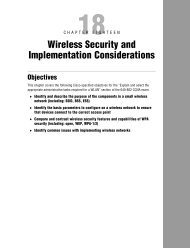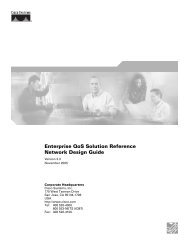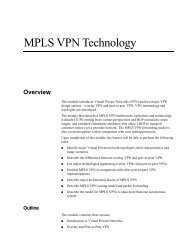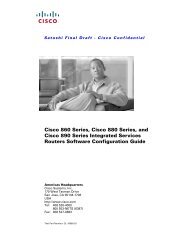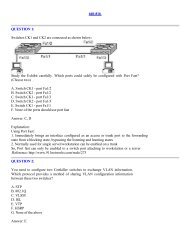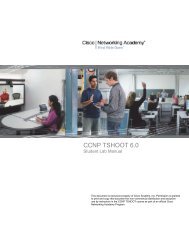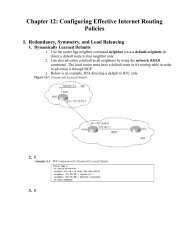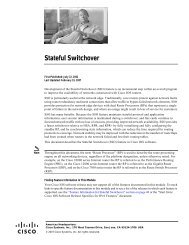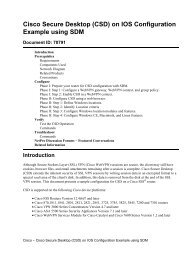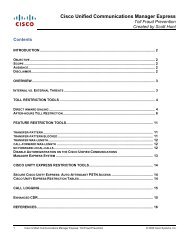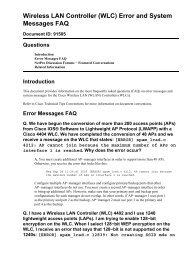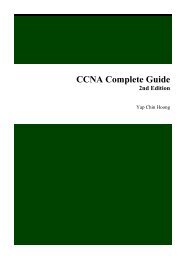Cisco Unified Contact Center Enterprise Solution Reference ...
Cisco Unified Contact Center Enterprise Solution Reference ...
Cisco Unified Contact Center Enterprise Solution Reference ...
Create successful ePaper yourself
Turn your PDF publications into a flip-book with our unique Google optimized e-Paper software.
<strong>Cisco</strong> <strong>Unified</strong> Mobile Agent Architecture<br />
6-4<br />
<strong>Cisco</strong> <strong>Unified</strong> <strong>Contact</strong> <strong>Center</strong> <strong>Enterprise</strong> 7.x SRND<br />
Chapter 6 <strong>Cisco</strong> <strong>Unified</strong> Mobile Agent<br />
2. A call to the phone number supplied at mobile agent login is initiated from the remote CTI port<br />
statically associated (by the PG) with the local CTI port used at login. When the agent answers, the<br />
call is immediately placed on hold. Until this process completes, the agent is not considered logged<br />
in and ready.<br />
3. A customer call arrives in the system and is queued for a skill group or an agent through normal ICM<br />
configuration and scripting. This processing is the same as for local agents.<br />
4. When an agent is selected for the call, and if the agent happens to be a mobile agent, then the new<br />
processing for mobile agent begins.<br />
5. The incoming call rings at the local CTI port used by the agent at login. The JTAPI gateway detects<br />
that the CTI port is ringing but has not immediately answered the call. The caller will hear ringing<br />
at this point.<br />
6. The agent's desktop indicates a call is ringing, but the agent phone does not ring because it is already<br />
off hook. If the agent does not answer within the configured time, RONA processing will be<br />
initiated.<br />
7. When the agent presses the answer button to accept the call, the customer call is answered and<br />
directed to the agent call media address. The agent call is then taken off hold and directed to the<br />
customer call media address.<br />
8. When the call ends, the customer connection is disconnected and the agent connection is placed back<br />
on hold. The agent is set to ready, not ready, or wrap-up, depending upon agent configuration and<br />
agent desktop input.<br />
A nailed-up agent can log off by using the desktop or by just hanging up the phone.<br />
With a nailed-up connection, auto-answer is allowed.<br />
Supported Mobile Agent and Caller VoIP Endpoints<br />
<strong>Cisco</strong> <strong>Unified</strong> Mobile Agents can log in to <strong>Unified</strong> CCE using any PSTN phone that gets routed to a<br />
<strong>Cisco</strong> Voice Gateway. That voice gateway may be registered with the same <strong>Cisco</strong> <strong>Unified</strong> CallManager<br />
cluster as the associated ICM Agent PG or may be registered with another <strong>Cisco</strong> <strong>Unified</strong> CallManager<br />
cluster. In addition to using a phone, a <strong>Cisco</strong> <strong>Unified</strong> Mobile Agent must use an agent desktop<br />
application.<br />
Any voice gateway supported by <strong>Cisco</strong> <strong>Unified</strong> CallManager and <strong>Unified</strong> CCE is supported for mobile<br />
agents. Caller (ingress) and mobile agent (egress) voice gateways can be configured with either H.323,<br />
MGCP, or SIP, and a combination of voice gateway types is also supported. The ingress and egress voice<br />
gateways can be the same voice gateway if supervisory silent monitoring is not required.<br />
<strong>Cisco</strong> <strong>Unified</strong> Mobile Agents can also log in using a <strong>Cisco</strong> IP Phone. The IP Phone could be configured<br />
for SIP or SCCP, and a mixture is also allowed. This IP Phone may be registered with the same <strong>Cisco</strong><br />
<strong>Unified</strong> CallManager cluster as the associated ICM Agent PG, or it may be registered with another <strong>Cisco</strong><br />
<strong>Unified</strong> CallManager cluster. Calls to mobile agents may also originate from SIP or SCCP IP Phones.<br />
If an agent is using an IP Phone on the same cluster as the associated ICM Agent PG, it is advantageous<br />
from the perspective of <strong>Cisco</strong> <strong>Unified</strong> CallManager performance for the agent to utilize Extension<br />
Mobility instead of the Mobile Agent feature. However, that IP Phone device would have to be<br />
associated with the ICM JTAPI user, and there is a small performance hit on <strong>Cisco</strong> <strong>Unified</strong> CallManager<br />
for making that association.<br />
OL-8669-05



